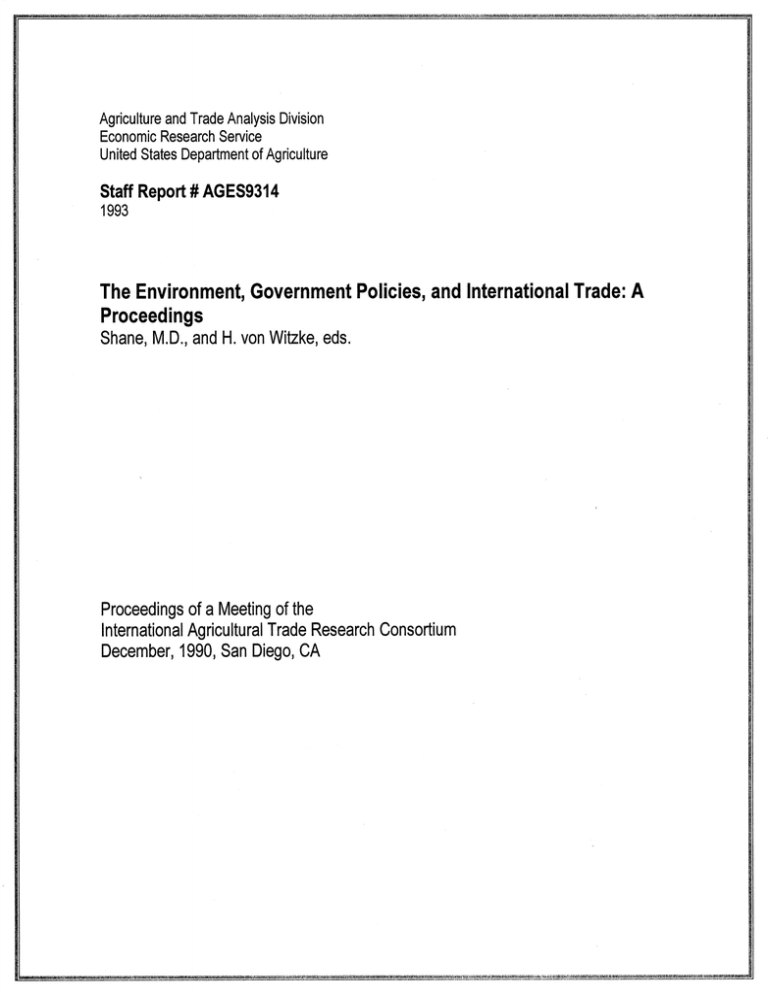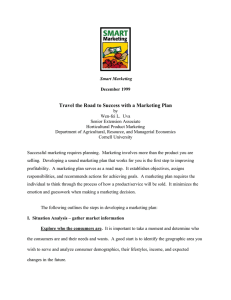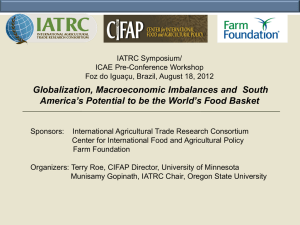Agriculture and Trade Analysis Division
advertisement

, ' ' y rrna+kan c+aran nxk . a., mc aras.,m xxasy-m s Agriculture and Trade Analysis Division Economic Research Service United States Department of Agriculture Staff Report # AGES9314 1993 The Environment, Government Policies, and International Trade: A Proceedings Shane, M.D., and H.von Witzke, eds. Proceedings of a Meeting of the International Agricultural Trade Research Consortium December, 1990, San Diego, CA )u a; a . . .. y; _ 7i "a'S 7'. " " F: :if ' e a d66 ,asva-.~rx:u _. .. The Environment, Government Policies, and International Trade: A Proceedings. Mathew D. Shane and Harald von Witzke (editors). Agriculture and Trade Analysis Division, Economic Research Service, U.S. Department of Agriculture. Staff Report No. AGES9314. Abstract The environment and how Government policies relate to the environment are increasingly important issues for trade economists. The suggestion made throughout this volume is that the environment under which agriculture operates physically, legally, and institutionally plays a profound role in determining emerging trade patterns. Major efforts are underway to change the rules of international trade under multilateral and bilateral trade negotiations. The outcome of these negotiations will substantially alter the structure of trade in years to come. Keywords: Environment, public goods, Government policies, agricultural trade, constitutional economics, GATT, Uruguay Round. Acknowledgments The editors recognize the valuable assistance of Diane Marshall in composing the volume as well as the editorial assistance of James Sayre and Lindsay Mann. The editors and the authors retain the final responsibility for any remaining errors. This report was reproduced for limited distribution to the research community outside the U.S. Department of Agriculture and does not reflect an official position of the Department. This volume contains a series of papers first presented at the 1990 annual meeting of the International Agricultural Trade Research Consortium. The authors are professors at different Universities in the United States and Canada, as well as staff of the Agricultural and Trade Analysis and Resource and Technology Divisions of the Economic Research Service. Although the papers went through a process of editing and review, they were not subject to formal peer review normally required of USDA Publications. The views expressed are those of the authors and do not represent positions of any of their respective organizations. 1301 New York Avenue, NW. Washington, DC 20005-4788 September 1993 Foreword This report contains papers presented at the December 1990 annual meeting of the International Agricultural Trade Research Consortium (IATRC) in San Diego, California. The theme of the meeting was the relationship between the environment, public goods, Government policies, and international trade. The interpretation of this theme by the various authors led to analyses of issues related to both the physical and institutional environment. None of these issues and problems are easy to analyze or solve. The very fact that the Uruguay Round of negotiations under the auspices of the General Agreement on Tariffs and Trade (GATT) is still unsettled more than 24 months past the initial deadline for an agreement attests to this difficulty. However, this set of issues is extremely important and will become even more important in the future. The growing pressures on the physical environment from continuing growth and development as well as the pressures on the institutional environment from changing technology of production, communications, and trade necessitate a fundamental rethinking and restructuring of the rules under which we have done business in the past. Our collective future depends critically on whether we can realize this goal. No effort of this sort is the result of only one or two individuals. Cochairmen and organizers of the theme day program were Mathew Shane of the Economic Research Service (ERS), U.S. Department of Agriculture (USDA), and Harald von Witzke of the University of Minnesota. The sponsorship of the IATRC made the conference possible. Don McLatchy of Agriculture Canada coordinated the second and third days of the meetings. The financial support of ERS, USDA's Foreign Agricultural Service, and Agriculture Canada was also critical. Laura Bipes of the University of Minnesota was responsible for the logistics of the meeting. The authors of the papers presented here made this volume possible. The proceedings is divided into three parts: the environment and international trade, policy reform and international trade, and political economy issues and international trade. The first part was the subject of the theme day. The remaining papers were presented on days two and three of the meeting. The IATRC is a group of government and university researchers who come together twice a year to focus on issues affecting the world's agricultural economy. The ability to bring together a relatively small 1ii group of researchers with common interests and concerns has proven to be a successful forum for discussion and debate on critical international trade issues. The consortium is a cooperative undertaking sponsored by ERS, FAS, Agriculture Canada, and U.S. and Canadian universities. Current membership is largely from the United States and Canada with some members from Europe (UK, France, Germany, Italy, Poland, and Hungary), Mexico, Australia, and New Zealand. Membership in the consortium is subject to approval by the consortium's executive committee, but is.generally opened to those involved in international agricultural trade research and analysis or its policy applications. Mathew Shane and Harald von Witzke iii Contents Page Chapter 1. Public Goods, the Environment, and International Trade ................ 1 by Mathew Shane and Harald von Witzke The Environment and International Trade 2. A Constitutional Political Economy Perspective on International Trade by Viktor Vanberg.................................. 6 3. International Public Goods, Export Subsidies, and the Harmonization of Environmental Regulations .................. ............... 24 by C. Ford Runge........ 4. The Growing Demand for Food Quality: Implications for International Trade ................. 45 by Jean D. Kinsey and James P. Houck 5. Effects of Domestic Environmental Policy on Patterns of International Trade .................. 67 by James A. Tobey............................... 6. The Conflict Between Trade Policy and Environmental Policy in Agriculture by Utpal Vasavada, Robert Saint-Louis, and Guy Debailleul.... 88 7. Of Models and Measures: Some Thoughts on the Use and Abuse of Policy Indicators by Tim Josling............................................................ 99 Policy Reform and International Trade 8. Potential Impact on World Agricultural Markets of Policy Reform in Central and Eastern Europe and the Soviet Union by Robert B. Koopman ................................................ 110 9. iv Are There Lessons from the Polish Agricultural Reform that Are Applicable to the Soviet Union? by Odin Knudsen....................................................... 132 10. Common Agricultural Policy Rebalancing: The Basis for Possible Agreement by James Gleckler and Luther Tweeten ................ 149 Political Economy Issues and International Trade 11. The Governance of Agricultural Trade: Perspectives from the 1940's by David W. Skully ......................... 165 12. Increased Protection in the 1980's: Exchange Rates and Institutions by David A. Stallings..... .............................................. 189 13. Endogenizing Government Behavior by Mary A. Marchant and Alex F. McCalla ................... 226 14. Global Grain Stocks and World Market Stability Revisited by Steven Martinez and Jerry Sharples ............................. 248




